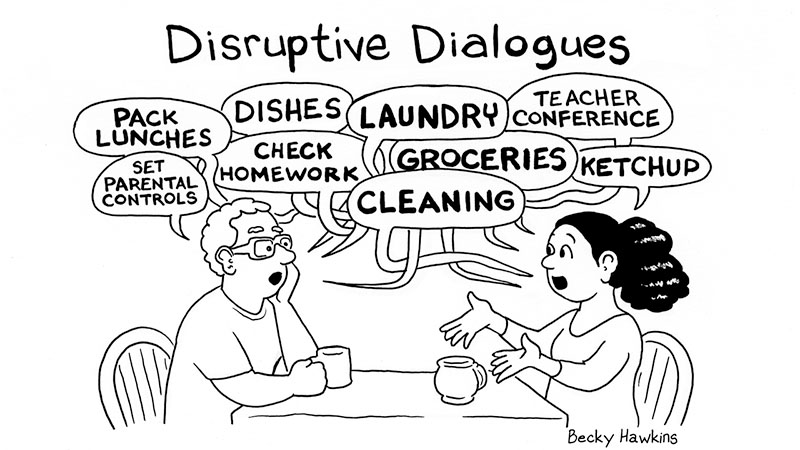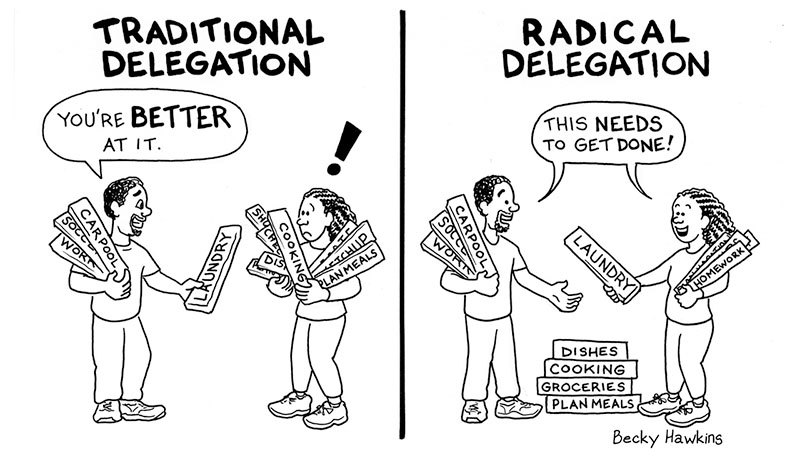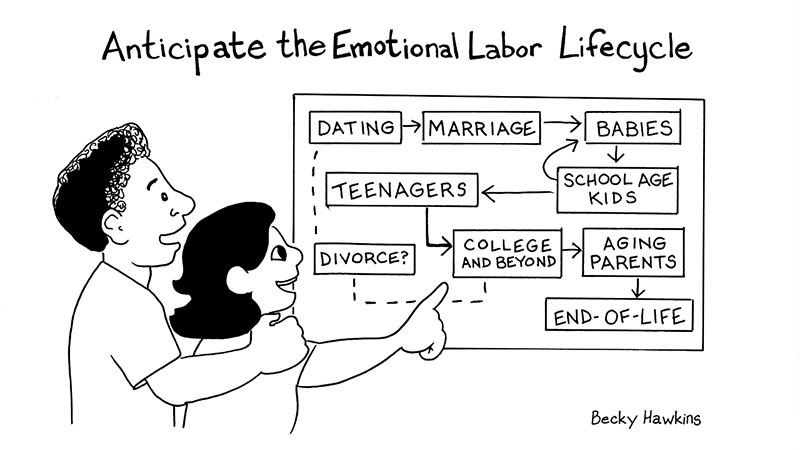If you do the heavy lifting of emotional labor in your household, then you know that the weight of it can be crushing. If you aren’t sure that you are shouldering the bulk of emotional labor in your household, here’s a review.
Emotional labor is the invisible, unnoticed, unwaged, unwritten, undervalued work women do at home and in the paid workforce. It is the thinking about what’s coming up, what needs to happen, how to look into the future to anticipate birthdays, family meals, holiday dinners, do we have enough toilet paper, how come we don’t have any more ketchup? Granted, all of these little tasks individually are easy to do but also supremely important to the functioning of a well-ordered home and to family happiness. AND…the tasks are like part of the clothing that women wear. It falls onto her shoulders like a giant set of shoulder pads.
You’re carrying the lion’s share of emotional labor when:
- You notice everything around you.
- You notice what everyone around you is doing.
- Everyone with whom you live thinks you’re the one who knows when the toilet paper is low.
- Your mother-in-law calls you to pick-up her meds
- Your 19-year-old daughter asks you to find the wrapping paper for her
- Although your husband was on “kid duty,” you’re the one who arranged for child care when his work plans changed.
- Your sister, who lives two states over, begs you to plan the family reunion…again.
- Although you have a full-time job, you’re taking a night class to complete a certification, so you leave dinner in frig for your husband to re-heat and feed the kids.
That last bullet – about prepping dinner before class – was something I would hear every semester during my 25 years as an adjunct professor of history and women’s studies. At the community colleges where I taught, my students ranged in age from 17 to 70, with an average age of early-to-mid-30s. These were the students who started working for wages right out of high school, and, believing in the American dream, wanted a better life for themselves and their families.
The majority of my students worked a 40-hour week and attended night classes once or twice a week. Many were married or living with their lover. They stayed after class to talk about their major or the next exam. Sometimes, when it was “just us girls,” the conversation nearly always took a turn from the academic to the personal when my female students shared their frustration and anxiety, and expressions of trying to “do it all,” to which I always responded, “Don’t bother trying, no one can.”
I imagine those students today, now in their forties and fifties with great jobs and supportive partners, but if my research of the past five years is any indication, these women are still trying to “do it all,” and I’m still saying, “Don’t bother trying, no one can.”

Julie’s house is a cluster of clutter. She’s anxious and upset over the mess, the major contributors being very busy 11-year-old twins, a daughter who is 5, and a husband who works long hours. She’s overwhelmed by the volume of physical and cognitive work that stands before her all day, every day, with no let-up in sight. She’s aware of the term “emotional labor” but continues to feel that managing it all is her job. She’s perfect for that long-ago “Calgon® take me away!” commercial, but really, most women I speak with believe there’s just not enough Calgon® on the planet.
If Betty Friedan had heard the term “emotional labor” when she published her ground-breaking 1964 book The Feminine Mystique, the problem would have been given a name! But now we do have a name: emotional labor. If you’re beleaguered, bothered, and bewildered, or just plain ticked off by the volume of never-ending work in your household, here are three strategies to stop doing it all: deliberating dialogue, radical delegating, and anticipating the lifecycle of emotional labor.
Deliberate dialogue: Chances are good you’ve had an argument or two about the cup left on the counter, the dish left in the den, the clothes that languish in the dryer. I’m no therapist but maybe it’s time to stop yelling and settle down into deliberate dialogues and talk about what’s actually happening at home, what work is getting done and by whom. No blaming, or pointing fingers, or carrying a resentment because one of you is doing too much. Simply talk about the work. In preparation for this first really deliberate dialogue, each person in the household list everything they believe they do to contribute to household management. If you do it, write it down with no filters, just write. Then talk about the lists in terms of value and importance. One list will surely be longer than the other. Engage in deliberate conversations about why various tasks have to be done, or not.

Radical Delegation: The whole point of delegation is to ensure a task gets done to completion. In the traditional practice of delegation, the person assigned to the task is often the best person to do that task. When it comes to household delegation, we all know that women are, hands down, the BEST at doing all the work. It’s as if centuries of historical training and the written accounts of women’s lives have prepared them for this eventuality. Maybe if women weren’t so darn good at doing “all that work” their “to do” lists would be a lot shorter! Clearly, we need another way to delegate!
Enter, the art and practice of radical delegation where tasks are assigned because they have to get done regardless of who is best at them. Radical delegation in a household requires two things: 1) a list of all the tasks, chores, and attending parts to each (making a dental appointment for a 10-year-old means finding a caring dentist, with office hours that fit your work schedule AND your child’s school schedule – all the parts!); 2) a deep desire and willingness to create equity in the home. Help each other develop ownership of each task – and then trust the process. Anticipate how you’ll deal with backsliding or forgetting or the myriad reasons why a task isn’t getting to completion. Outsource if you have the luxury, barter with friends and neighbors if that works for everyone. The goal: Get the damn thing done.
Deliberate dialogues and radical delegation should become part of how you do the business of the household, and all made easier once you can learn to anticipate the the Emotional Labor Lifecyle. Emotional labor – and all the work attendant thereof – is an ongoing, non-stop, always-in-your-face, never-ending list of “to dos.” If you are over the age of 25, you have noticed that there is always something coming up that you have to do. Imagine how different moving through life could be if you could really anticipate not only life-changing events, but to also anticipate myriad tasks associated with each event. Recognizing each stage of the Emotional Labor Lifecycle is an opportunity to engage in deliberate dialogues, and work out radical delegation strategies.

The Emotional Labor Lifecycle is about life transitions and emotional labor that can be expected as you move through your entire life. If you’re seeking to change the way you’ve always done things, if you are hoping for a more equitable distribution of labor within the household, then it’s important to know, understand, and accept your starting point: who is doing what, and when, and for whom? The Emotional Labor Lifecycle provides a great opportunity to start these dialogues with the other adult in your home, and is essential to moving things closer to equity, so you can stop doing all the emotional labor.
April 2022
